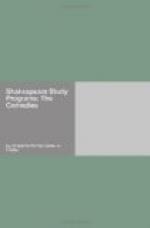What are the situations which the story gives Shakespeare a chance to develop? On the one hand, is the Duke pouring out his love for another woman to his supposed page, who is in love with him, and thus giving rise to the series of scenes between the Duke and Viola. On the other hand, is the supposed page pressing his master’s suit to a woman who loves the supposed page, and thus giving rise to the series of scenes between Viola and Olivia. Out of this love of Olivia for Viola grows the absurd situation of Viola’s being obliged to fight a duel, which is made still more ridiculous through the circumstance of her challenger being a fool. Out of Viola’s resemblance to her brother and her disguise grows the absurd situation of Olivia’s claiming her as a husband, and that of Sir Andrew taking for his unwilling duellist the all-too-willing Sebastian.
To these situations which naturally result from the story, Shakespeare has added in Olivia’s household a set of characters whose personality is such that amusing situations are multiplied. Thus we may say that the play is one of situation rather than of action, since whatever of action there is in it leads to situation, and whatever of character there is in it leads also to situation.
QUERIES FOR DISCUSSION
1. If attention is constantly given to creating humorous situations, will character-development necessarily suffer? 2. Do you agree with the Shakespearian critic Verplanck that this play bears no indication either of an original groundwork of incident, afterwards enriched by the additions of a fuller mind, or of thoughts, situations, and characters accidentally suggested, or growing unexpectedly out of the story, as the author proceeded?
II
THE WHIMSICAL AND OTHER ALLUSIONS IN THE PLAY
Pick out and explain the curious allusions in the play, noticing that these may be classed as geographical, mythological, astrological, or referable to persons or customs of the time, or books of the day. For examples of the latter class, note Sir Toby’s ‘diluculo surgere’ (II. iii.), for ‘Saluberrimum est dilucolu surgere,’ an adage from Lilly’s Grammar, doubtless one of Shakespeare’s text-books at the Edward VI. School in Stratford; and Viola’s ’Some Mollification for your giant sweet lady’ (I. v.),—an allusion to the innumerable romances whose fair ladies are guarded by giants; for Maria, being very small, Viola ironically calls her giant, and asks Olivia to pacify her because she has opposed her message. (For Shakespeare’s education and school-books, see Bayne’s remarks on this subject in Brit. Encyc. art. Shakespeare.) The whole incident of the ‘possession’ of Malvolio, and the visit of Sir Topas, probably alludes to a tract published in 1599 by Dr. Harsnett,—’A Discovery of the Fraudulent Practices of John Darrel,’—in which is narrated how the Starkeys’ children




